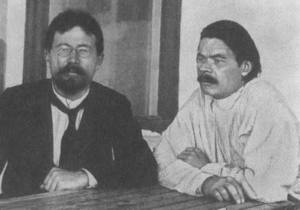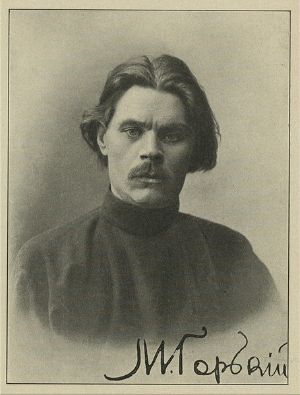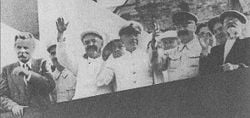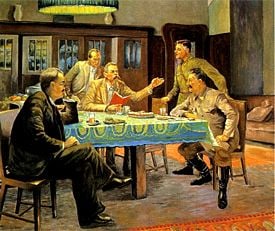Maxim Gorky
Editing Maxim Gorky From Wikipedia, the free encyclopedia. Jump to: navigation, search
- For other uses, see Maxim Gorky (disambiguation).
Aleksei Maksimovich Peshkov (In Russian Алексей Максимович Пешков) (March 28 [O.S. March 16] 1868–June 14, 1936), better known as Maxim Gorky (Максим Горький), was a Soviet/Russian author, a founder of the socialist realism literary method and a political activist. He was born in the city of Nizhny Novgorod, later renamed Gorky in his honor, and died in Moscow. From 1906 to 1913 and from 1921 to 1929 he lived abroad, mostly in Capri; after his return to the Soviet Union he accepted the cultural policies of the time, although he was not permitted to leave the country.
Life
Gorky became an orphan at the age of nine and was brought up by his grandmother, an excellent storyteller. Her death deeply affected him, and after an attempt at suicide in December 1887, he travelled on foot across the Russian Empire for five years, changing jobs and accumulating impressions used later in his writing.


Gorky began writing under pseudonym Иегудиил Хламида (Jehudiel Khlamida), publishing stories and articles in newspapers of the Volga region. He began using pseudonym Gorky (literally "bitter") in 1892, while working in Tiflis newspaper Кавказ (The Caucasus). Gorky's first book, a two-volume collection of his work entitled Очерки и рассказы (Essays and Stories) was published in 1898. It enjoyed great success and catapulted him to fame.
At the turn of the century, Gorky became associated with the Moscow Art Theater, who would stage some of his plays. He also became affliated with Marxist journals Life and New Word. He publicly opposed the Tsarist regime and was arrested numerous times. Gorky befriended many professional revolutionaries he encountered and became Lenin's personal friend after they met in 1902. He exposed governmental control of the press (see Matvei Golovinski affair). In 1902, Gorky was elected the honorary Academician of Literature, but Nicholas II ordered to annul this election. In protest, Anton Chekhov and Vladimir Korolenko left the Academy.
While briefly imprisoned in Peter and Paul Fortress during the abortive Russian Revolution of 1905, Gorky wrote the play Children of the Sun, nominally set during an 1862 cholera epidemic, but universally understood to relate to present-day events. In 1905 he officially joined the ranks of the Bolshevik faction in the Russian Social Democratic Labor Party. He left the country in 1906 to avoid arrest, traveling to America where he wrote his most famous novel, Mother.
He returned to Russia in 1913. During World War I, his apartment in Petrograd was turned into a Bolshevik staff room, but his relations with the Communists turned sour. Two weeks after the October Revolution of 1917 he wrote: "Lenin and Trotsky don't have any idea about freedom or human rights. They are already corrupted by dirty poison of the power, this is visible by their shameful disrespect of freedom of speech and all other civil liberties for which the democracy was fighting." Lenin's 1919 letters to Gorky contain threats: "My advice to you: change your surroundings, your views, your actions, otherwise life may turn away from you."
In August 1921, Nikolai Gumilyov, his friend, fellow writer and Anna Akhmatova's husband, was arrested by Petrograd Cheka for his monarchist views. Gorky hurried to Moscow, attained the order to release Gumilyov from Lenin personally, but upon his return to Petrograd he found out that Gumilyov has already been shot. In October Gorky emigrated to Italy on bad health grounds: he had tuberculosis.

According to Aleksandr Solzhenitsyn, Gorky's return was motivated by the material interests. In Sorrento Gorky found himself without money and without glory. He visited the USSR several times after 1929, and in 1932 Joseph Stalin personally invited him to return from the emigration for good, an offer he accepted. In June, 1929 Gorky visited Solovki (cleaned up for this occasion) and wrote a positive article about the Gulag camp that already gained ill fame in the West.
Gorky's return from fascist Italy was a major propaganda victory for the Soviets. He was decorated by the Order of Lenin and given a mansion (formerly belonged to millionaire Ryabushinsky, currently Gorky Museum) in Moscow and a dacha in the suburbs. One of the central Moscow streets, Tverskaya, was renamed in his honor, as well as the city of his birth. The largest airplane in the world in the mid-1930s, the Tupolev ANT-20 (photo), was also named Maxim Gorky. It was used for propaganda purposes and often demonstratively flew over the Soviet capital.
In 1933 Gorky edited an infamous book about the Belomorkanal, presented as an example of "successful rehabilitation of the former enemies of proletariat."
With the step-up of Stalinist repressions and especially after the death of Sergei Kirov in December 1934, Gorky was placed under unannounced house arrest in his Moscow house. He was supplied daily with a special edition of the newspaper Pravda containing no news about arrests or purges.
The sudden death of his son Maxim Peshkov in May 1935 was followed by the death of Maxim Gorky in June 1936. Both died under suspicious circumstances, but speculations that they were poisoned have never been proven. Stalin and Molotov were among those who hand-carried Gorky's coffin during the funerals.
During the Bukharin trials in 1938, one of the charges brought up was that Gorky was killed by Yagoda's NKVD agents.
Gorky's city of birth was renamed back into Nizhny Novgorod in 1990.
Selected works
- Makar Chudra (Макар Чудра)
- Chelkash (Челкаш)
- Petit-Bourgeois (Мещане)
- Malva
- Creatures That Once Were Men
- Twenty-six Men and a Girl
- Foma Gordeyev (Фома Гордеев)
- Three of Them (Трое)
- A Confession (Исповедь)
- Okurov City (Городок Окуров)
- The Life of Matvei Kozhemyakin (Жизнь Матвея Кожемякина)
- Children of the Sun (Дети солнца), 1905
- Mother (Мать), 1907
- The Lower Depths (На дне)
- Childhood (Детство), 1913–1914
- In the World (В людях), 1916
- Song of a Storm petrel (Песня о Буревестнике)
- Song of a Falcon (Песня о Соколе)
- My Universities (Мои университеты), 1923
- The Artamonov Business (Дело Артамоновых)
- Life of Klim Samgin (Жизнь Клима Самгина)
- Reminiscences of Tolstoy, Chekhov, and Andreyev
- V.I.Lenin (В.И.Ленин)
Works about Gorky
- The Gorky Trilogy is a series of three feature films—The Childhood of Maxim Gorky, My Apprenticeship, and My Universities—directed by Mark Donskoy, filmed in the Soviet Union, released 1938-1940. The trilogy was adapted from Gorky's autobiography.
Quotes
- "Если враг не сдается, его уничтожают" (An enemy who doesn't give up shall be destroyed)
See also
- Maxim Gorky (airplane)
- Asteroid 2768 Gorky, named after the writer
- Ekaterina Peshkova Gorky's first wife
- Zinovy Peshkov
- Gorky Park
External link
- Brief biography
- Maxim Gorky Internet Archive at Marxists.org
- Maxim Gorky at the Internet Movie Database
- "Anton Chekhov: Fragments of Recollections" by Maxim Gorky
- Some works of Maxim Gorky in the original Russian
- The Song of the Stormy Petrel in original Russian
- Works by Maxim Gorky. Project Gutenberg
ar:مكسيم غوركي bg:Максим Горки cs:Maxim Gorkij de:Maxim Gorki es:Máximo Gorki eo:Maksim GORKIJ fa:ماکسیم گورکی fr:Maxime Gorki it:Maksim Gorkij he:מקסים גורקי nl:Maksim Gorki ja:マクシム・ゴーリキー no:Maksim Gorkij pl:Maksim Gorki pt:Máximo Gorki ro:Maxim Gorki ru:Горький, Максим fi:Maksim Gorki sv:Maksim Gorkij tt:Maksim Gorki tr:Maksim Gorki uk:Горький Максим zh:高尔基
Edit summary:
Cancel | Editing help (opens in new window)
Templates used on this page: Template:Clearright Template:Commons Template:Gutenberg author Template:Imdb name Template:OldStyleDate Template:Otheruses Template:Wikiquote Insert: Á á É é Í í Ó ó Ú ú À à È è Ì ì Ò ò Ù ù  â Ê ê Î î Ô ô Û û Ä ä Ë ë Ï ï Ö ö Ü ü ß Ã ã Ñ ñ Õ õ Ç ç Ģ ģ Ķ ķ Ļ ļ Ņ ņ Ŗ ŗ Ş ş Ţ ţ Ć ć Ĺ ĺ Ń ń Ŕ ŕ Ś ś Ý ý Ź ź Đ đ Ů ů Č č Ď ď Ľ ľ Ň ň Ř ř Š š Ť ť Ž ž Ǎ ǎ Ě ě Ǐ ǐ Ǒ ǒ Ǔ ǔ Ā ā Ē ē Ī ī Ō ō Ū ū ǖ ǘ ǚ ǜ Ĉ ĉ Ĝ ĝ Ĥ ĥ Ĵ ĵ Ŝ ŝ Ŵ ŵ Ŷ ŷ Ă ă Ğ ğ Ŭ ŭ Ċ ċ Ė ė Ġ ġ İ ı Ż ż Ą ą Ę ę Į į Ų ų Ł ł Ő ő Ű ű Ŀ ŀ Ħ ħ Ð ð Þ þ Œ œ Æ æ Ø ø Å å Ə ə – — … [] [[]] {{}} ~ | ° § → ≈ ± − × ¹ ² ³ ‘ “ ’ ” £ € Α α Β β Γ γ Δ δ Ε ε Ζ ζ Η η Θ θ Ι ι Κ κ Λ λ Μ μ Ν ν Ξ ξ Ο ο Π π Ρ ρ Σ σ ς Τ τ Υ υ Φ φ Χ χ Ψ ψ Ω ω
Your changes will be visible immediately. For testing, please use the sandbox. You are encouraged to create and improve articles. The community is quick to enforce the quality standards on all articles. Please cite your sources so others can verify your work. On discussion pages, please sign your comment by typing four tildes (David Burgess 03:59, 15 November 2005 (UTC)).
DO NOT SUBMIT COPYRIGHTED WORK WITHOUT PERMISSION All edits are released under the GFDL (see WP:Copyrights). If you don't want your writing to be edited and redistributed by others, do not submit it. Only public domain resources can be copied exactly—this does not include most web pages.
Retrieved from "http://en.wikipedia.org/wiki/Maxim_Gorky" ViewsArticleDiscussionEdit this pageHistory Personal toolsCreate account / log in Navigation Main PageCommunity PortalCurrent eventsRecent changesRandom articleHelpContact usDonations Search
Toolbox
What links here Related changes Upload file Special pages
About Wikipedia Disclaimers
Credits
New World Encyclopedia writers and editors rewrote and completed the Wikipedia article in accordance with New World Encyclopedia standards. This article abides by terms of the Creative Commons CC-by-sa 3.0 License (CC-by-sa), which may be used and disseminated with proper attribution. Credit is due under the terms of this license that can reference both the New World Encyclopedia contributors and the selfless volunteer contributors of the Wikimedia Foundation. To cite this article click here for a list of acceptable citing formats.The history of earlier contributions by wikipedians is accessible to researchers here:
The history of this article since it was imported to New World Encyclopedia:
Note: Some restrictions may apply to use of individual images which are separately licensed.




